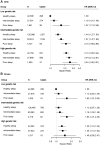Sleep patterns, genetic susceptibility, and incident cardiovascular disease: a prospective study of 385 292 UK biobank participants
- PMID: 31848595
- PMCID: PMC7071844
- DOI: 10.1093/eurheartj/ehz849
Sleep patterns, genetic susceptibility, and incident cardiovascular disease: a prospective study of 385 292 UK biobank participants
Abstract
Aims: To quantify the association of combined sleep behaviours and genetic susceptibility with the incidence of cardiovascular disease (CVD).
Methods and results: This study included 385 292 participants initially free of CVD from UK Biobank. We newly created a healthy sleep score according to five sleep factors and defined the low-risk groups as follows: early chronotype, sleep 7-8 h per day, never/rarely insomnia, no snoring, and no frequent excessive daytime sleepiness. Weighted genetic risk scores of coronary heart disease (CHD) or stroke were calculated. During a median of 8.5 years of follow-up, we documented 7280 incident CVD cases including 4667 CHD and 2650 stroke cases. Compared to those with a sleep score of 0-1, participants with a score of 5 had a 35% (19-48%), 34% (22-44%), and 34% (25-42%) reduced risk of CVD, CHD, and stroke, respectively. Nearly 10% of cardiovascular events in this cohort could be attributed to poor sleep pattern. Participants with poor sleep pattern and high genetic risk showed the highest risk of CHD and stroke.
Conclusion: In this large prospective study, a healthy sleep pattern was associated with reduced risks of CVD, CHD, and stroke among participants with low, intermediate, or high genetic risk.
Keywords: Cardiovascular disease; Genetic predisposition to disease; Sleep behaviour.
Published on behalf of the European Society of Cardiology. All rights reserved. © The Author(s) 2019. For permissions, please email: journals.permissions@oup.com.
Figures




Comment in
-
MicroRNAs and other mechanisms underlying the relation between sleep patterns and cardiovascular disease.Eur Heart J. 2020 Jul 7;41(26):2502. doi: 10.1093/eurheartj/ehaa349. Eur Heart J. 2020. PMID: 32380520 Free PMC article. No abstract available.
-
Sleep patterns, genetic susceptibility, and incident cardiovascular disease: the role of miRNAs.Eur Heart J. 2020 Jul 7;41(26):2501. doi: 10.1093/eurheartj/ehaa348. Eur Heart J. 2020. PMID: 32380540 No abstract available.
References
-
- Tobaldini E, Costantino G, Solbiati M, Cogliati C, Kara T, Nobili L, Montano N.. Sleep, sleep deprivation, autonomic nervous system and cardiovascular diseases. Neurosci Biobehav Rev 2017;74:321–329. - PubMed
-
- He Q, Sun H, Wu X, Zhang P, Dai H, Ai C, Shi J.. Sleep duration and risk of stroke: a dose-response meta-analysis of prospective cohort studies. Sleep Med 2017;32:66–74. - PubMed
-
- Li W, Wang D, Cao S, Yin X, Gong Y, Gan Y, Zhou Y, Lu Z.. Sleep duration and risk of stroke events and stroke mortality: a systematic review and meta-analysis of prospective cohort studies. Int J Cardiol 2016;223:870–876. - PubMed
Publication types
MeSH terms
Grants and funding
- R01 DK078616/DK/NIDDK NIH HHS/United States
- R01 DK115679/DK/NIDDK NIH HHS/United States
- R01 DK091718/DK/NIDDK NIH HHS/United States
- U54 GM104940/GM/NIGMS NIH HHS/United States
- R21 HL126024/HL/NHLBI NIH HHS/United States
- R01 HL034594/HL/NHLBI NIH HHS/United States
- R01 HL071981/HL/NHLBI NIH HHS/United States
- MC_PC_12028/MRC_/Medical Research Council/United Kingdom
- MC_QA137853/MRC_/Medical Research Council/United Kingdom
- 29186/CRUK_/Cancer Research UK/United Kingdom
- P20 GM109036/GM/NIGMS NIH HHS/United States
- U01 DK078616/DK/NIDDK NIH HHS/United States
- R01 DK100383/DK/NIDDK NIH HHS/United States
- MC_PC_17228/MRC_/Medical Research Council/United Kingdom
- UM1 DK078616/DK/NIDDK NIH HHS/United States

